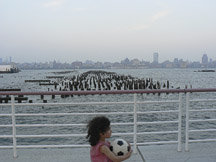The Jersey City Municipal Utilities Authority (JCMUA) has reached a settlement with the federal government to resolve violations of the Clean Water Act, according to the U.S. Justice Department.
Under terms of the settlement, the JCMUA has agreed to pay a $375,000 fine, and will also spend more than $52 million to repair and upgrade its sewerage infrastructure. In addition, the city agency will replace nearly 25,000 feet of sewer lines and remove old sewer systems from private residences and upgrade these systems so the homes will have direct connections to the city sewer system. This work could cost as much as an additional $550,000, according to the Justice Department.
‘This agreement addresses critically important and long-overdue upgrades.’ – Ignacia S. Moreno
____________
“This agreement, like others reached with cities across the country, addresses critically important and long-overdue upgrades to the municipal sewer system in Jersey City, which are required if JCMUA is to achieve compliance with the nation’s Clean Water Act,” said the Justice Department’s Assistant Attorney General for the Environment and Natural Resources, Ignacia S. Moreno, in a statement. “Among the actions required by the agreement, a supplemental environmental project will replace privately-owned sewers with direct sewer connections, directly benefiting economically disadvantaged residents by improving wastewater collection and preventing sewage backups in their homes.”
Old system overburdened
According to the EPA, combined sewer systems are designed to transport sewage, industrial wastewater and rainwater runoff in the same pipes to wastewater treatment plants. During heavy rains the amount of wastewater traveling through a combined sewer system can exceed the capacity of the treatment plant.
Any resulting floods are known as combined sewer overflows, and contain not only storm water but pollutants like human waste, industrial waste, toxic materials, chemicals, and debris. Collectively, they pose risks to human health, and threaten water habitats and wildlife.
“Investment in municipal infrastructure and local commitments like those in today’s agreement are practical and necessary solutions to sewer overflow problems,” said Judith Enck, administrator for EPA’s Region Two Office, which includes New Jersey. “[The] agreement will help improve water quality in waters around Jersey City and protect community residents from exposure to raw sewage and contaminated stormwater, now, and into the future.”
The settlement, which must still be approved by a federal court, is subject to a 30-day public comment period. A copy of the consent decree is available on the Department of Justice web site and can be viewed by visiting www.usdoj.gov/enrd/consent_decrees.html.
E-mail E. Assata Wright at awright@hudsonreporter.com.
